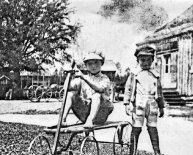
Boy Scouts California camping Menu
Camping Food
A Whole Bunch of Suggestions to Help You Eat Better in the Great Outdoors
Here are bunch of camp food suggestions from some of the good folks on the Scouts-L Youth Groups Discussion List.
Minute Rice and Other Good Things
To add to Ronalds suggestions; Minute Rice now has a long grain and wild rice mix that was a hit on our last outing. I am a big fan of Ziplock Freezer bags, put the mix in the Ziplock bag and add boiling water. The bags are strong enough to not melt or break. I usually use two, just in case but have never had one fail.On the subject of bag cooking, check out your local health food store for dehydrated refried beans. Rehydrate in the bag, squeeze onto a tortilla, add cheese and salsa and you have a crowd pleasing fast lunch entree.
Tomato powder has many uses, you can get tomato bouillon in the Mexican food section of Wal-Mart Supercenters.
- Thanks to Greg Gough, SM Troop 201, Ozark, MO
Some Backpacking Suggestions
Backpacking chow can be really good if you just think about it. The old standby with me is Ramen noodles. Take a package or two of Ramen (more if you're feeding more people) and prepare according to directions. Add a can of boned chicken, tuna, or whatever to the noodles to heat. Add chopped scallions, green pepper, dried and reconstituted mushrooms, sun-dried tomatoes, slivered carrots, or any other backpackable veggie (one that won't get crushed easily and will keep a day or two out of the fridge.The Ramen noodles also don't require draining, as the water you use becomes the soup when you add the seasoning packet. Have Koolaid or instant iced tea with this, some dried fruit, pita bread and margarine out of a squeeze bottle, and you've got a fine high-carbo meal that will stick with you the next day during the next 10 miles.
I've also tried the spaghetti sauce out of an envelope, not a jar. This is pretty good, too, although a bit bland. The package directions call for 2 1/4 cups water, a couple tablespoons of oil, and a small can of tomato paste. Bring this to a boil, add the packet of spices, and simmer 15 minutes. Add to it whatever else you want in the way of veggies. I add summer sausage here, since summer sausage keeps without refrigeration as long as you don't open the packet. Angel hair pasta works well, too, since it only takes 2-3 minutes to cook. And add some spices to jazz up the sauce.
Any of you tried making a backpacking DO? I saw this at a roundtable a couple of months ago. Buy a 9" pie pan, and 2 8" cake pans. Bolt the pie pan back-to-back to one of the cake pans by drilling holes and using short bolts. The pie pan becomes the lid to the DO, and the cake pan on top is where you put the coals when you are baking. The second cake pan is where the food goes. Set the contraption on some rocks and put coals underneath, and coals on top, and you've got a small but serviceable backcountry7 DO-works great on brownies, biscuits, etc.
Breakfasts in the back country are usually of the Poptart/bagel/dried fruit/coffee/cocoa variety, although we make pancakes once in a while with the pancake flour that only requires adding water. Instant dehydrated syrup is about the only item I need to buy at a specialty camp food store these days.
Lunches are invariably of the trail variety-i.e., no cooking. Deviled ham or chicken, pita bread, cheese, dried fruit again, maybe a carrot stick, Koolaid, etc. Some of my guys even eat Vienna sausages (urrrrpp.)
There are also a ton of DO cookbooks around, and I think one is available through someone on this list.
- Thanks to Pete Farnham, SM, Troop 113, GW District, NCAC, Alexandria, VA
Meal Planning
One thing we have used to help them think up ideas is the one-pot-meal planner table. Write on the board 4 column headings:
Meat/Protein - Starch - Sauce - Vegetable
Begin with the first column. Ask the Scouts to list all of the meat or other protein foods they can think of. Chicken, beef, cheese, eggs, etc.
Then go to the second column, list the starches: bread, pasta, rice, potato, stuffing mix, etc.
The third column: tomato sauce, gravy, soy, teriyaki, cream, etc.
Finally, the vegetables: you get the idea (somehow spinach never makes it up there).
Now, let's plan a one-pot meal: take one item from each column and put them all in one pot. Now some preparation might be needed for some components, and some items might need special cooking techniques, but that's how you can teach them to begin planning and cooking real meals. By picking your foods carefully, you can create some interesting backpack meals as well.
When we started this about 5 years ago, we saw a lot of macaroni & cheese and spaghetti. We seldom see either any more, and in fact, one time the Patrol Leader changed the menu because he wanted mac/cheese and his patrol revolted, refusing even to eat it. The last few camporees, our patrols have consistently received honorable mentions in the cooking competitions.
If you don't raise the expectations, you won't ever see your Scouts really learn to cook.
- Thanks to Alan R. Houser ** Scoutmaster, Berkeley Troop 24 **
Sausage for Backpacking
Read a number of people had tried Landjaeger sausage for their backpacking outing & commented how well it kept, but most could not remember they had gotten it, "Just somewhere in Wisconsin." I have an address that hopefully will help: Ruef's Meat Market, 538 First Street, New Glarus, WI 53574. (608) 527-2554 - They do ship. They make it themselves using the "old recipe" It truley is a Swiss sausage using both beef & pork, never needs refrigeration, so makes the perfect backpacking snack & better tasting than dried jerky. No, I don't own the company, just learned about it as my son was learning about the Swiss people, while earning his American Cultures Merit badge. No doubt a few "Wisconsin" bragging rights from me also! Hope it helps
- Thanks to Cindy, Troop 760, Horicon
Here's a Few Quick Guidelines for Planning Camping Menus
First of all think of the planned activities and adjust the menu accordingly. Choosing dishes that can be prepared with the gear that will be available, keeping in mind trash disposal facilities, is the first step. Of course you can be more exotic with meals prepared on a car camping trip vs. backpacking. The other main concern is any special dietary requirements for the individuals participating.
The main nutritional item to worry about is energy. Carbohydrates, proteins and fats are the primary energy sources to consider. Carbos and proteins are about equal, but fats carry about 2.25 times the calories per pound. On most typical Scouting...

















